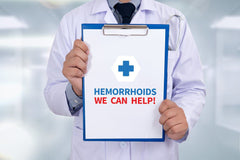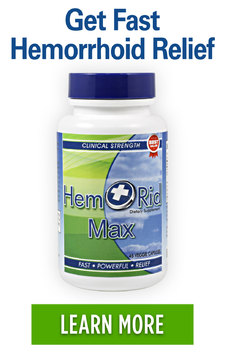How Do You Get Hemorrhoids? Discover the Various Ways You Get Hemorrhoids and What You Can do
Posted on 23 March 2018 by Maryanne Johnson
Share this post
Wondering how do you get hemorrhoids? Hemorrhoids are quite literally a pain in the butt.
While an uncomfortable topic, take solace in the fact that the majority of adults are not immune to them, and about 3 out of every 4 adult over the age of 50 will get or already has hemorrhoids.
We have done extensive research on hemorrhoids.
Because hemorrhoids are so common, there are fortunately many different treatment options that have been discovered.
Effective treatments can be done at home and most methods use natural ingredients to ease the pain commonly associated with hemorrhoids.
So, How Do You Get Hemorrhoids?
Hemorrhoids happen to both men and women. Although they occur with the same frequency to both genders, hemorrhoids tend to form for older adults.
The exact cause is unknown, but researchers do know that veins inside the lower rectum become inflamed and swollen, resulting in hemorrhoids.
Pregnant women are known to be more susceptible in getting hemorrhoids. The added weight on their bodies from the growing fetus puts pressure, strain, and stress on the lower half of the body.
Pregnant women also commonly experience constipation, which is one of the causes behind hemorrhoids.
This guide can help if you are struggling to deal with hemorrhoids when pregnant.
Lifting heavy objects is also another instigator of hemorrhoid inflammation.
Putting additional stress on this area of your body disrupts the blood flow and sometimes will cause hemorrhoids to form.
How Do You Get External Hemorrhoids?
External hemorrhoids can be painful.
This is because external hemorrhoids form on underneath the skin surrounding the anal opening.
You may notice bumps around the anus, some may even be discolored, and this is an indication that you have external hemorrhoids.
External hemorrhoids can sometimes form blood clots.
As if hemorrhoids couldn’t get any more painful, blood clots can cause even more discomfort, even at the slightest touch.
This type of hemorrhoid is called thrombosis hemorrhoid.
A clot is formed when blood collects in an external hemorrhoid. Occasionally, a thrombosed hemorrhoid will burst and bleed.
Banding is a minimally invasive hemorrhoid procedure that can be used for thrombosed hemorrhoids (1).
How Do You Get Internal Hemorrhoids?
Internal hemorrhoids take form inside the lower rectum.
In this region, we do not have nerve endings that can sense pain, so often times, we are unaware of the development or presence of internal hemorrhoids.
Internal hemorrhoids will only show themselves by bleeding painlessly.
During a strained bowel movement, the surface of your internal rectum can become damaged, which causes the bleeding.
Complications of internal hemorrhoids include protruding or prolonged hemorrhoids, also known as prolapsed hemorrhoids.
This occurs when a hemorrhoid is pushed out of the anal opening.
This can be quite painful, but the solution is to gently push the prolapsed hemorrhoid back through the opening.
If that doesn't work, you better go see your hemorrhoid doctor for help.
Your doctor may recommend Doppler-guided hemorrhoidal artery ligation or a stapled hemorrhoidectomy for treatment (2).

Research has found that patients who have used Gabapentin after their hemorrhoidectomy surgery have experienced less hemorrhoid pain.
How Do You Get Rid of Hemorrhoids Fast?
Fortunately, hemorrhoids usually disappear within a few days.
Even without treatment, hemorrhoids tend to heal themselves and the inflammation slowly disappears from the veins.
Hemorrhoids are also rarely a dangerous medical condition. However, your veins and skin surrounding the anal opening can easily erupt into swelling again if you are not careful.
Maintaining a healthy colon is essential in preventing hemorrhoids from forming again. All in all, prevention is the key to getting rid of hemorrhoids—and keeping them away—fast.
Steps you can take to get rid of hemorrhoids—and prevent them:
- Exercise: It is important to remember to not overexert yourself when exercising with painful hemorrhoids. Avoid weightlifting but instead go for a brisk walk or jog. Exercising promotes circulation, and as our doctors always tell us, helps with our overall health. Exercise has proven benefits to skin, heart, internal organs, and for hemorrhoids, exercise will help keep our bodies regular.
- Ointments and creams: Stop hemorrhoid pain almost immediately with the best hemorrhoid ointments and creams. You can find creams that are made from natural ingredients with anti-inflammatory properties that can ease pain, reduce swelling, and stop discomfort. While the hemorrhoids do not go away right away, using ointments and creams to subside the symptoms will help the hemorrhoids to heal faster. Creams and different types of ointments can be purchased as over the counter medication or prescribed by your doctor. Creams are also great at stopping hemorrhoidal burning and itching.
- Hydration: You always hear your doctor telling you to drink more water—about 8 glasses a day to be exact. This regulation is important to keep in mind, especially for hemorrhoids. Drinking enough water pushes food and everything else along through your body. Again, a regular colon will help prevent hemorrhoids from forming.
- Fiber: One of the most essential methods in preventing hemorrhoids, eating a diet that consists of a lot of fiber can help with bowel movements and in keeping your colon regular. Fiber can be taken in supplements and also found in plenty of different foods, like vegetables, fruits, whole grains, and other sources.
- Medication: Pain relievers that are available for over the counter consumption are helpful in temporarily easing the symptoms of hemorrhoids. Medicines like Tylenol or Aspirin are designed to reduce inflammation, which can help heal your hemorrhoids more quickly. Our whole OTC hemorrhoid medication guide can help you find the best medications to take when suffering with hemorrhoids.
- Hemorrhoid Supplement: HemRid Max is a supplement that is great at reducing the symptoms of hemorrhoids, including itching, bleeding, burning, and more.
Whether you are experiencing external or internal hemorrhoids, it is important to make sure you are eating, drinking, and exercising appropriately to prevent them from occurring and prolonging your condition.
Hemorrhoids can be extremely painful, and some not painful at all, but with a simple inclusion of a healthy amount of fiber, a regular colon can be greatly beneficial in prevention.
Although hemorrhoids are relatively harmless, it is still important to talk to your doctor if you show signs of bleeding in the rectal region.
There is a possibility that hemorrhoid bleeding could be a sign of a more serious medical condition. Also be sure to consult your doctor before you employ any hemorrhoid treatment method that is considered risky.





0 comments